Spear of Macragge Read online
Page 5
A stilted layer of return fire was coming from the necrons now that they had advanced far enough across the ice plain, but it was sporadic and at extreme range. Certainly, nothing to trouble the Ultramarines armour on the ridge.
Even still, the sergeant could not put his mind at ease.
‘Bring us in closer, but circle the flanks,’ he voxed up to their pilot, prompting an immediate shift in velocity and altitude from the Thunderhawk.
‘Do you see it too, brother-sergeant?’
Scipio turned sharply at the resonant, machine-like voice. Something in his subconscious almost made him draw his pistol, but it was no necron that addressed him. It was Vantor, skulking in the shadows behind them.
‘See what?’ asked Scipio, though he thought he knew the Techmarine’s meaning.
‘A trap…’
‘We all see it, Techmarine, it is Chronus’s–’ Brakkius began.
‘Around our armour, brother,’ Vantor corrected. ‘This is but a feint.’
‘How is that even possible?’ snapped Brakkius. ‘Look at them, they are all but defeated. There is no tactical acumen at work, just mechanised shells slaved to routine.’
‘I agree,’ said Vantor, ‘but analyse that battlefield below us… What word comes to mind when you see the necrons?’
Brakkius snarled, still not comprehending. ‘Scrap. Metal.’
‘Bait,’ said Scipio, believing the Techmarine but unsure what their next move should be. ‘And how do you suggest I convey to the commander that he is being drawn into a trap?’
‘What trap?’ asked Brakkius, exasperated. He gestured to the decimated necrons. ‘It’s already over.’
Vantor ignored him, and looked impassive as he answered Scipio’s question.
‘How do you tell a hero of Ultramar his perfect strategy is part of an elaborate enemy ruse? I’m not sure you can, brother-sergeant.’
Scipio looked down onto the battlefield.
The Predators were engaging.
Novus pushed the Rage of Antonius up to combat speed, leading the first squadron by the smallest of margins. Rather than envelop the necron infantry in a pincer-like movement that would amply suit a ground-based force, Chronus had the two lines attack in file obliquely so they overlapped and enfiladed the enemy prior to the point of intersection.
The Rage of Antonius was on its first pass, The Vengeful and Hellhunter on its tracked heels in close squadron formation, when the optimum range marker flashed on the tank commander’s retinal display.
‘Unleash guns!’ Chronus roared, without ceremony. War sang in his heart, buoyed higher through the exhilaration of tank-mounted combat. Still rolling at combat speed, the Predator’s turret swung around to forty-five degrees and released a searing lance of energy. The azure beam struck the edge of a necron formation and vaporised one of the automatons. It was followed fractionally later by a second beam. Paired phase-outs overlapped, creating a bright burst of viridian energy. Capacitors in the Rage of Antonius took a few seconds to build back up to power before a second volley was released.
Targets in his sights, Chronus poured on the punishment, shifting his aim and the turret as the battle tank moved. The side sponsons chattered below, spitting out shells that detonated upon impact and chewed holes in the packed necron ranks. The heavy bolters kept up a steady refrain, audible between the high-pitched whine of the pounding lascannon.
Twelve engines released their weapons on one flank, whilst on the opposite side the half-dozen Land Raiders lit up the dwindling snowstorm with ranks of explosive muzzle flare from assault cannons and hurricane bolters. Las-beams, distant on the opposite side of the battlefield but getting closer, stabbed from the shadows like spears of light and were joined by the barking report of heavy bolters. Necrons were cut apart. Those struck by the lascannons were summarily destroyed in actinic flashes. The solid-shell weapons took a heavier toll at first, levelling a veritable deluge of fire, but several necrons were showing signs of self-repair and those felled in the earlier salvos were returning to their dauntless ranks.
Down the centre, the bombardment ceased as the other tanks came to within the two hundred metre no-fire zone. It mattered little – the necrons had been drawn into the trap and were being picked apart by Chronus’s armoured squadrons.
‘Dismantle you,’ the tank commander said to himself, holding fire for a moment to appreciate the carnage his engines were causing, ‘piece by piece.’
Through the open hatch of the Gladius, the battlefield below looked strung out. From his vantage leaning out of the hold, Scipio saw vast gaps emerging in the necrons’ previously closed ranks. Even the slow-moving automatons had reverted to defensive protocols now, recognising the danger posed by the artillery to their front and the more dynamic battle tanks to their flanks and rear.
Keeping up a steady stream of verdant gauss fire, the necrons towards the core of their now slowly collapsing formations remained still, whilst those further out and cut off began to retreat. Like the musket regiments of old Terra, they were forming square.
As part of Roboute Guilliman’s teachings in the Codex Astartes, all Ultramarines were comprehensively versed in military tactics, both contemporary and archaic. Scipio recognised what the necrons were doing at once. They attempted to fight their enemy on all fronts and prevent them from breaking up their coherency. Only these were not mere cavalrymen armed with lance and flintlocks; the battle tanks of the Ultramarines Chapter assailed them. Their outmoded strategy was fated to fail. And yet, the idea persisted in the brother-sergeant that these mechanoids were just sacrificial, intended to draw Chronus and his battle tanks in.
Straying from the systematic destruction of the necrons, Scipio’s gaze was drawn to the ice. The constant barrage, the heat of energy discharge from las-weapons and gauss flayers had damaged its integrity. He looked through the scopes, training them on a point just outside the shrinking square of necrons.
‘Pilot, bring us in closer,’ he voxed.
With the dull growl of engine deceleration, the Gladius descended.
‘What is it? What do you see?’ hissed Vantor before the others could speak.
‘I’m not sure… Increasing magnification.’
The image through the scopes blurred then quickly refocused, a line of data scrolling down one side of the lens telling Scipio he was at maximum range. There were small fissures in the ice, nothing that would split it; the frozen plain was thick and densely packed. But it was not this that had caught the sergeant’s attention.
‘I see…’ he began, ‘a shadow.’
‘Say that again,’ said Brakkius, staring down at the point where his sergeant was looking, trying to see the same shadow but without success.
‘Under the ice,’ Scipio went on, his heart rate increasing with sudden, irrational urgency.
He looked up from the scopes as the shadow came so close and grew so large against the frosted lens of surface ice that even Brakkius and the others saw it.
‘Fortress of Hera!’ the second-in-command shouted.
Suddenly the gunship they were riding in felt perilously low.
‘Kastus,’ Scipio said quickly into the vox. ‘Bring us up!’
The Gladius was rising just as a vast flash of light ignited to the west, within a half-kilometre of where Chronus had almost vanquished the necron infantry. It was massive, like a verdant sunrise only much faster and more violent. Scipio had seen its like before: it was a teleportation flare.
‘Guilliman’s blood…’ breathed Brakkius.
The necrons had activated a phase generator and transported an entire phalanx into sudden and immediate battle.
Auris and Largo stared, disbelieving, and Garrik made the sign of the old Legion, a single clenched fist, against his breastplate.
‘We’ve sprung the trap, brother-sergeant,’ said Vantor.
Scipio snarled into the vox. ‘Bring us up, damn it!’
Within the verdant light, which was slowly dying after the force of its
dramatic arrival, a second necron horde had emerged.
‘Not infantry,’ said Garrik, sighting through his launcher’s targeter.
‘Something worse…’ added Vantor.
The Gladius was rising, Kastus pushing the turbofans to achieve a faster escape velocity.
Facing down the rapidly deploying flanking force, Scipio already knew they would not be fast enough.
An entire fleet of large skimmer-tanks was surging across the ice plain, devouring the kilometres between them and the Ultramarines with alarming speed. Before Scipio could get a decent look at the force in the dying after-flare of their materialisation, a slew of crackling beams arced from several necron turrets. One struck the left wing of the Gladius as Kastus was attempting to turn, ripping up one of the turbofans.
Thrown back into the hold and slamming into Vantor and Brakkius, Scipio saw a spit of flame shoot up from the engine, smoke pluming a second later before being sucked up by the still-turning fan and coiling in over itself.
Alert sirens were wailing in the hold, the engine noise high-pitched, almost desperate. If the Gladius had a living, beating heart, some sense of anima, it had just been wounded and was crying out in pain.
‘Hold on!’ Kastus bellowed through the vox, the sound of emergency systems kicking in audible in the background as the pilot struggled to keep them airborne.
‘What else does he expect us to do?’ growled Brakkius, clinging to the overhead rail.
The Thunderhawk was spinning, the gaping hatch revealing ever-quickening flashes of the advancing necron host and then the harsh white of ice mountains. The former was shrinking as the latter grew inexorably closer.
Ditching fast, the Gladius would not clear the rugged terrain that was rapidly advancing upon them.
‘Brace yourselves,’ Scipio shouted above the shrieking engine noise bleeding in from the outside. He managed to get on his battle-helm and bring up the ident-markers for his combat squad as well as one for Vantor.
The Techmarine was kneeling, his servo-arms extended and braced either side of the hold to keep him steady. Vantor had no helmet, so the Ultramarines aboard the stricken gunship could see him muttering litanies of function to soothe the Gladius’s injured machine-spirit.
‘Maybe we should all start chanting,’ sniped Brakkius.
Scipio shot him a stern look through his retinal lenses.
‘Just hold on.’
With a spurt of throttle, the damaged turbofan cycled down to a full stop, leaving Kastus relying on the remaining engine to keep them up. Its protests were loud and discordant – it was not going to keep them aloft for long.
Scipio tried to catch a look out of the side hatch, but the terrain was whipping by too quickly for him to determine how far they had strayed from the battlefield. In its current predicament, directionality was not a facility the gunship had in abundance at that moment. It was taking all of Kastus’s concentration and effort just to keep them going and find a safe place to land. Wherever that was, it would be far from the ice plain now.
Scipio felt a sudden shift in velocity, a brief interlude of anti-gravity followed by an acute sinking sensation, and assumed they had dipped. The Gladius was burning at full speed; peaks and crags jetted by in a frost-hazed blur.
Despite the disadvantage of having only one functioning turbofan, Kastus had guided them around the peaks and was racing through a narrow canyon.
The Ultramarines in the hold grimly seized the crash rails. There was no way they could reach their harnesses and strap in. The slightest upright movement could throw them out of the gaping hatch and into the white void streaking beyond it.
With the creak of sundering metal, the rail where Brakkius was clinging bent and came away from its fixings. He hung on for another second, roaring defiantly, before the railing snapped and was thrown loose.
Despite the risk to himself, Scipio reached out one-handed to grab the flailing Ultramarine. His gauntleted fingers snagged armour, then slipped as Brakkius was torn from his grasp.
‘Brother!’
Horrified, Scipio thought he was about to watch his second-in-command be dragged to almost certain death when Vantor pinned him with one of his servo-arms. Brakkius cried out as his back and shoulder were pierced, but at least he was secured.
There was no time to feel relief. Kastus’s voice crackled through the vox just as the engine noise rose sharply in pitch and the violent shuddering felt within the hold increased.
‘We’re going down,’ he said. ‘We’re going–’
They struck earth. The engine noise ceased abruptly, overwhelmed by the sound of buckling, splitting armour. Scipio thought he saw a chunk of wing ripped off, spiralling away down their flank before the ice and rock piled through the open hatch, suffocating everyone inside the hold.
Light became dark, sound became silence. The shuddering, jolting gunship finally grew still. Scipio’s head struck metal. The right side of his helm crumpled, crazing the retinal lens as he hit the interior wall or one of his brothers – he didn’t know which – and felt something warm trickle down the side of his face inside his helmet before blacking out.
CHAPTER SEVEN
NOWHERE TO HIDE
Featureless ice sped past below, so fast it blurred into a smear of seemingly endless white. Storm squalls broke against the edge of the flyer like waves striking the bow of a ship, but nothing slowed it. It was moving at hyper-velocity now, running at supersonic and cutting through the belligerent wind with sickle-edged ease.
Pilot did not notice. No chill touched his body, though he was cocooned in a cockpit open to the elements and wore no flight suit or visored helmet. He experienced no exertion of any kind, no sense of inertia as his craft knifed through the air at such a phenomenal speed. Hail whipped against the flyer’s hull, against his exposed ‘skin’, but he paid it no heed. It was as inconsequential as the battle on the ice plain he had left behind several minutes ago. Emotion, even one as bright and blazing as hate, did not feature in his limited consciousness. For Pilot, sentience was reduced to the data stream and what it told him.
Multitudinous stacks of operational protocols streamed across his vision, enhanced cogitation assessing each before accessing prefigured routines and responses. A shift in wind speed, a sudden airburst, and Pilot activated the secondary protocol that told him to dip his wing and change the flyer’s angle of approach.
His twin craft, far too divorced from any bonds of brotherhood to be considered a wingman, performed a similar manoeuvre, reacting to the selfsame protocols. Both were acutely aware of each other’s presence, but not in the conventional sense. Pilot visualised the second flyer as a line of data, only acknowledged through the inclusion of the additional protocols it afforded within his vast but prescribed decision matrix.
Proximity markers entering the data stream provided further options for Pilot to sift through. He increased speed, deaf to the atonal shriek emanating from the flyer’s aggressive approach. A second concomitant data stream aligned onside the first, informing Pilot his twinned craft had mirrored the manoeuvre.
Up ahead, a large structure began to materialise through the ice fog. Pilot saw it in the data-feed first, a stream of code that unlocked a tertiary vault of responses. Then his cold machine eyes saw the city and he vectored towards the aspect which possessed the lowest threat ratio in order to increase the chances of mission success. This too was relayed and cogitated through the myriad datastacks.
Pilot felt no pity for the beings of flesh within the city’s walls; only cold logic raged through his android brain. He processed, adapted and realigned with the addition of new data. He did not feel in any way. He had no desire for carnage, but that was what Pilot brought with him on scythed wings; carnage and death.
Conditions in Infirmary Seven were overcrowded and far from sanitary. Buckets brimming with reams of used bandages and gauze lay clustered together in the corners, waiting to be cleaned or burned. Blood slicked the floor in places, waiting to be sluic
ed away. The warehouse-turned-medicae centre was capacious but the injured numbered in the hundreds, just at this location alone. Herded here in their droves, the men and women inside were like cattle. Beds were stacked close together, some rigged up as bunks for the more stable or terminal patients that could not be moved. Intravenous lines were hooked up to the extant machinery too cumbersome to move out for the barricades, or looped around bed rails. Some were even held by diligent servitors slaved to that single task.
The moment he stepped past the guard detail outside and entered the makeshift infirmary, Falka had to cover his nose and mouth. The place reeked of blood and contagion, the air thick with it and ringing with the screams of those undergoing emergency surgeries. Misery touched everything, clinging like a second skin. It was a product of despair, one that had affected all of Damnos since the invasion and was slowly eroding what little resolve its people had left.
Through the dingy light of overhead phosphor tubes that did little to lift the gloom of the place, Falka saw a small army of medics, orderlies and servitors rushing to keep the Damnosian wounded alive a little longer. Most wore masks to retard the worst of the stench, a few even utilised the mouth cups from Guard rebreathers.
Pressing through the mob of walking wounded, careful not to cause any further distress, Falka found what he took to be the nearest medic and gently gripped his shoulder.
Exasperated, the medic turned. He was a young man, too gaunt for his actual years, Falka suspected, and wore a smock stained dark with blood.
‘You one of the orderlies I requested?’ snapped the medic, without waiting for Falka to speak.
‘I– no, I–’ Falka began, wrong-footed.
‘Good,’ said the medic, seemingly hearing what he wanted to. ‘Name’s Rauter.’
‘Kolpeck, Falka,’ said Falka, events running a little too fast for him to keep up.
‘Follow me, please, Kolpeck.’ He turned on his heel, wading through the waves of meandering injured men and women, shouting orders here and there. To whom, Falka had no idea. It seemed chaotic in the shadowy infirmary. With bodies pressed so close together, it felt as if he were back in the One Hundred about to face the necron assault all over again.

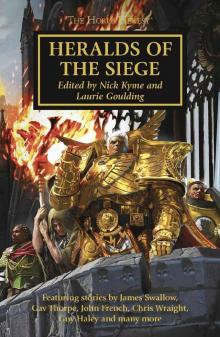 Heralds of the Siege
Heralds of the Siege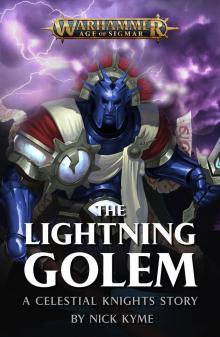 The Lightning Golem
The Lightning Golem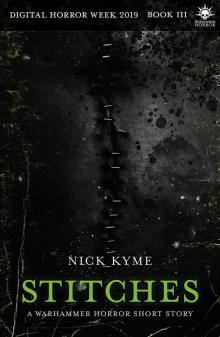 Stitches
Stitches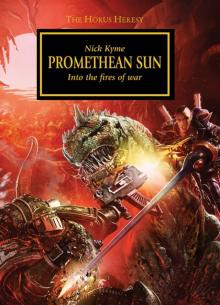 Promethean Sun
Promethean Sun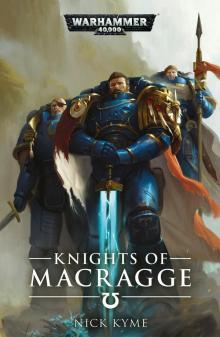 KNIGHTS OF MACRAGGE
KNIGHTS OF MACRAGGE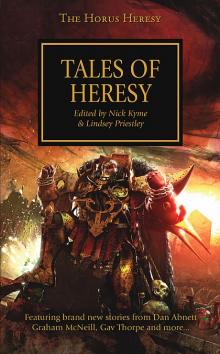 Tales of Heresy
Tales of Heresy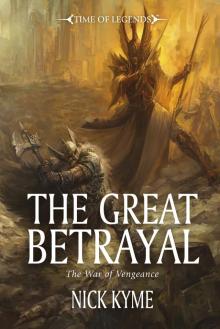 The Great Betrayal
The Great Betrayal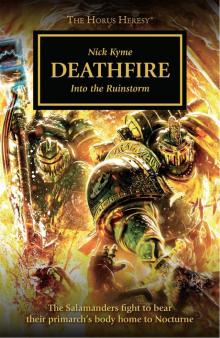 Deathfire
Deathfire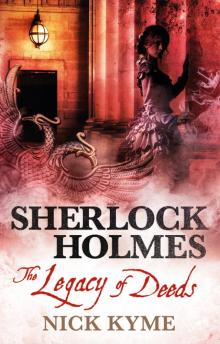 Sherlock Holmes--The Legacy of Deeds
Sherlock Holmes--The Legacy of Deeds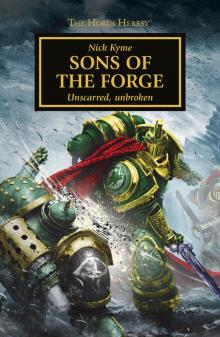 Sons of the Forge
Sons of the Forge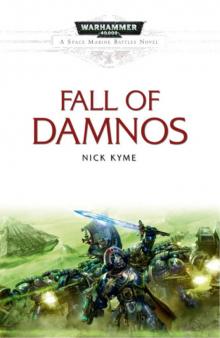 Fall of Damnos
Fall of Damnos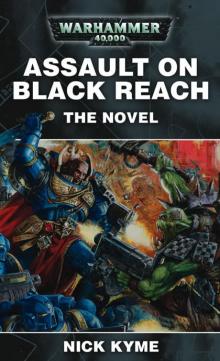 Assault on Black Reach: The Novel
Assault on Black Reach: The Novel![[Horus Heresy 10] - Tales of Heresy Read online](http://i1.bookreadfree.com/i/03/27/horus_heresy_10_-_tales_of_heresy_preview.jpg) [Horus Heresy 10] - Tales of Heresy
[Horus Heresy 10] - Tales of Heresy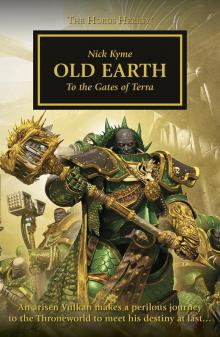 Old Earth
Old Earth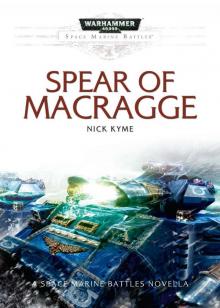 Spear of Macragge
Spear of Macragge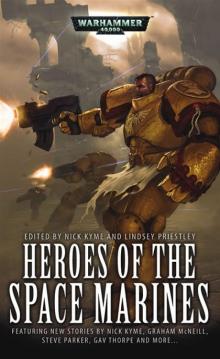 Heroes of the Space Marines
Heroes of the Space Marines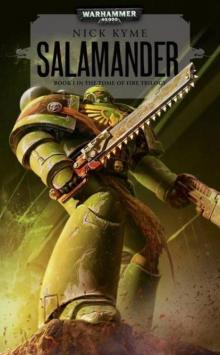 Salamander (warhammer 40000)
Salamander (warhammer 40000)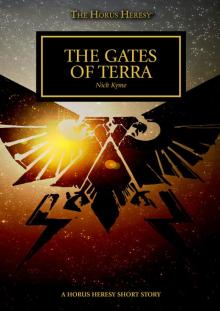 The Gates of Terra
The Gates of Terra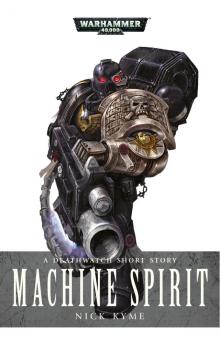 Machine Spirit
Machine Spirit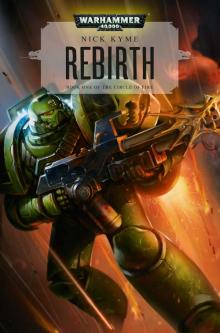 Salamanders: Rebirth
Salamanders: Rebirth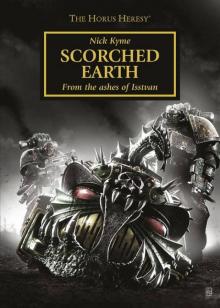 Scorched Earth
Scorched Earth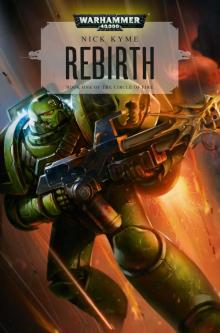 Rebirth
Rebirth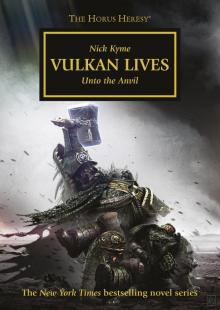 Vulkan Lives
Vulkan Lives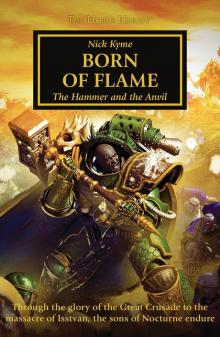 Born of Flame
Born of Flame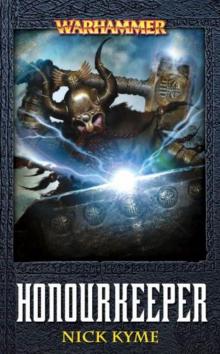 Honourkeeper
Honourkeeper